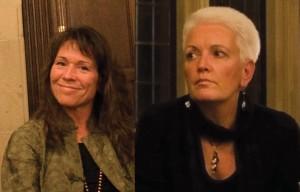Senior policy advisers to the McCain and Obama campaigns made their cases for their candidates in Copley Formal Lounge last night as they addressed the difficult task awaiting the next president in rebuilding America’s standing and reputation in the world.
The event, “Crossroads: Future of U.S. Foreign Policy,” which was hosted by the Mortara Center for International Studies and the Georgetown International Relations Club, featured a representative from each campaign – Kori Schake, senior policy adviser to the McCain campaign, and Gayle Smith, foreign policy adviser to the Obama campaign.
In front of a packed, standing-room only audience, the representatives outlined how the presidential candidates would shape their foreign policy if elected in November.
Schake, speaking first, noted that McCain believes it is the country’s fundamental responsibility to aid democracies in need.
“John really believes that the best way to think about how a state will behave in the international order is to look at how a state behaves towards its own people,” Schake said. “As a result of that, he really believes that for there to be an enduring peace in the international order, it has to be based on freedom.”
Smith followed by laying out Obama’s broad foreign policy vision and the general importance of reaching out to weak and failing democratic states. According to Smith, Obama’s foreign policy will work on all fronts, using political diplomatic tools, economic strategies and military action when necessary.
“[Obama’s] theory is that we have a common security and a common humanity,” she said. “I think that in this belief, which is evident across every foreign policy issue he addresses, we see something that is very critical for our future and for your future. That is someone who can lead at home and lead abroad.”
Smith also discussed Obama’s position on Afghanistan, which incorporates diplomacy, economic development and regionally specific agendas as a long-term solution to the strife in the country.
Schake countered by noting McCain’s support for the wars in both Iraq and Afghanistan, but at the same time emphasized the Arizona senator’s critique of the Bush administration’s management of these conflicts.
“All of us, both in the McCain campaign and the Obama campaign, who are critics of the Bush administration, believe that the administration has cost the United States quite a high price in terms of our standing in the world and relationships with others in the world,” Schake said.
Schake described McCain’s plan for Afghanistan as most rooted in partnership with the Afghanis – and adding that working and cooperating with the people of a country is the only way to rebuild America’s standing in the world.
She said that McCain’s foreign policy plan also extends beyond the Middle East, noting the significance of his support of free trade and belief in the need for the establishment of more free trade agreements with countries such as Colombia and South Korea.
Obama’s vision centers on a change from the current administration’s reluctance to engage in diplomacy, Smith said.
“I believe that Barack Obama will tolerate divergent views at home and abroad,” Smith said. “I think he is bold enough to listen to our allies even when they disagree with us. That is a huge departure from where we are now.”
The two representatives fielded questions after their addresses from students on a wide range of issues, including the effectiveness of the surge in Iraq, the effects of the global financial crisis on each of the candidates’ platforms and the role of the United Nations in the next four years.
“








